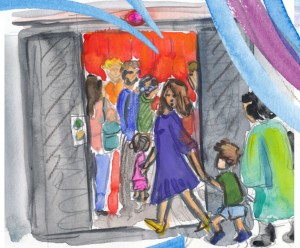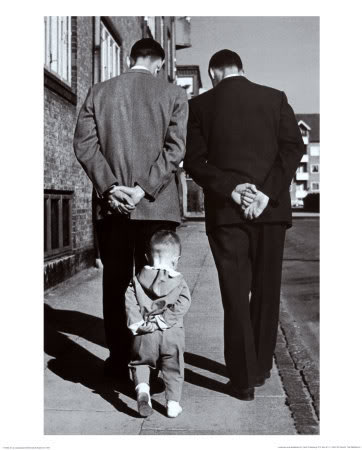Waldorf News
No More 1950’s: How Simplicity Parenting is the Way to Prepare Kids for a Complex Future

By KIM JOHN PAYNE
By now, we are all familiar with the conversation about American parenting and the concern with over scheduling. And there is a growing consensus that maybe our kids really are being run ragged by the pressure to perform and, to our credit, we are looking into the problem.
But at the same time, we are talking about extending the school year, hitting the same old panic button over our sinking test scores and our (in)ability to compete in the world market.
Until we see clearly what our goals are and how to meet them, we will forever be on this rollercoaster of trying to zoom ahead and then putting on the brakes – a life of whiplash for American families.
So what can we agree on? We all know we must prepare our kids for The Future. President Obama says this:
The first step in winning the future is encouraging American innovation. None of us can predict with certainty what the next big industry will be or where the new jobs will come from. Thirty years ago, we couldn’t know that something called the Internet would lead to an economic revolution. What we can do – what America does better than anyone else – is spark the creativity and imagination of our people.
Who can argue with that?
So when we hold this idea of adult innovative thinkers ready to tackle the world in our minds and when we try to roll the tape backwards and see what kind of childhood these uber adults would have needed, our own lack of creativity stumps us. We fall back on the future we were holding out for — the stable company career where we fine-tuned our vocation, our specialty, our area of expertise, and in return received security and a pension for our old age. Adulthood like that could benefit from a childhood where we learn things from within a box, are taught to meet expectations and people-please. It’s the super structured childhood we keep going back to.
 But those days are over. To get a job at Google, say, a programmer needs to be able to write code on a whiteboard, on the spot, confusing their habitual way of sitting at the keyboard. This clever trick is asking the applicant to show just how well they can perform when their little world is shaken up. When looking for employees, Google says they “want to know how you’ve flexed different muscles in different situations; we’re looking for people who have a variety of strengths and passions, not just isolated skill sets; we’re less concerned about grades and transcripts and more interested in how you think.”
But those days are over. To get a job at Google, say, a programmer needs to be able to write code on a whiteboard, on the spot, confusing their habitual way of sitting at the keyboard. This clever trick is asking the applicant to show just how well they can perform when their little world is shaken up. When looking for employees, Google says they “want to know how you’ve flexed different muscles in different situations; we’re looking for people who have a variety of strengths and passions, not just isolated skill sets; we’re less concerned about grades and transcripts and more interested in how you think.”
If we rewind to a childhood that makes an adult like that, what do we see? Is it racing around from one prep course to another? From soccer to piano to Mandarin? A childhood on the clock and filling up the gaps with zoning on the iPad and obsessing about making more friends on Facebook?
I don’t think so.
A movement like simplicity parenting, a way of life that promotes play and creativity and honors a kids’ needs and natural rhythms, can seem so Little House on the Prairie, like a privilege for those precious few who don’t need to prepare their kids for a tough road ahead. But nothing could be further from the truth. In fact, the super-scheduled childhood is a throwback to the 1950’s, as if life is ever going to be so structured and straightforward again!
When we really look at what happens for a kid when they slow down, tune in to themselves, take space and get busy in serious play, we can see that what they are learning is how to be create a kind of inner structure that will serve them (and us) well in the world ahead. After all, what future employees need is a variety of skill sets that they can apply in multiple areas. This is the very definition of play: You have a breakthrough and then you apply it in multiple areas. Ah, so this dress snaps like this! Now I can put it on all my dolls. Play provides a deep and wide-reaching domain for kids to experiment with the real work of the real world.
 The world our children are moving into is rapidly deconstructing. The average stay in any one job is under three years. Many economists project that self-employment or what I think of as “blended employment” will become an increasing feature of the economic landscape. Those that have jobs experience fewer structured benefits. The world ahead is going to require people who can substantially “create” their own structure, not solely rely on others to do it for them.
The world our children are moving into is rapidly deconstructing. The average stay in any one job is under three years. Many economists project that self-employment or what I think of as “blended employment” will become an increasing feature of the economic landscape. Those that have jobs experience fewer structured benefits. The world ahead is going to require people who can substantially “create” their own structure, not solely rely on others to do it for them.
Subjecting a child to a life of super structured and fast-paced activity in order to prepare him/her for the world is a well-meaning falsehood and a more than serious mistake. Simplicity Parenting is not some silly retro concept. It is a forward-looking attempt to help families get real about what we’re facing. The great news is that we don’t have to do that much to introduce our kids to the benefits of their own intelligence and freedom. Just relax a little bit. Give them just a bit more space than you think you can. Allow playtime to extend just a few minutes longer. It doesn’t take much to bring out the innate capacities for innovation that are already there. In fact, covering it up takes a lot more effort. And all of us who need your kids’ brilliance in the future will thank you for it.
(This article first appeared in the Huffington Post in September 2012. This is an edited version of that article.)
 Association for a Healing Education
Association for a Healing Education Immersive Academics and Arts
Immersive Academics and Arts Summer Programs - Culminating Class Trips
Summer Programs - Culminating Class Trips Roadmap to Literacy Books & Courses
Roadmap to Literacy Books & Courses Waldorf-inspired Homeschool Curriculum
Waldorf-inspired Homeschool Curriculum Bay Area Teacher Training
Bay Area Teacher Training Middle School Science With Roberto Trostli
Middle School Science With Roberto Trostli Art of Teaching Summer Courses 2025
Art of Teaching Summer Courses 2025 ~ Ensoul Your World With Color ~
~ Ensoul Your World With Color ~ Space speaks. Its language is movement.
Space speaks. Its language is movement. Caring for All Stages of Life
Caring for All Stages of Life Waldorf EC Training & Intensives in Canada
Waldorf EC Training & Intensives in Canada Flexible preparation for your new grade
Flexible preparation for your new grade Jamie York Books, Resources, Workshops
Jamie York Books, Resources, Workshops Transforming Voices Worldwide
Transforming Voices Worldwide Apply Today: New Cohort Starts Nov. 2025
Apply Today: New Cohort Starts Nov. 2025 Storytelling Skills for Teachers
Storytelling Skills for Teachers Train to Teach in Seattle
Train to Teach in Seattle Everything a Teacher Needs
Everything a Teacher Needs Full-Time Teacher Education
Full-Time Teacher Education Discovering the Wisdom of Childhood
Discovering the Wisdom of Childhood The Journey is Everything
The Journey is Everything Bringing Love to Learning for a Lifetime
Bringing Love to Learning for a Lifetime Quality Education in the Heartland
Quality Education in the Heartland Dancing for All Ages
Dancing for All Ages Grade Level Training in Southern California
Grade Level Training in Southern California The Art of Administration and Leadership
The Art of Administration and Leadership RSS Feeds
RSS Feeds